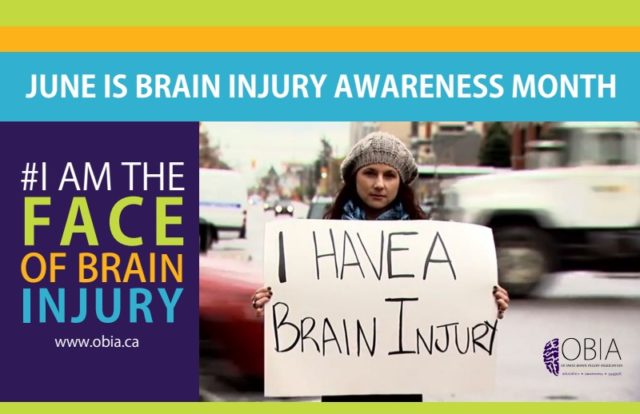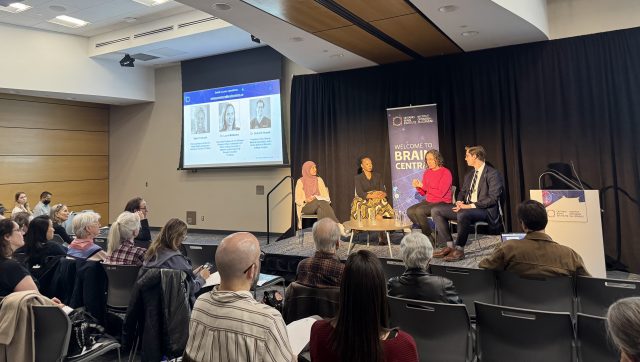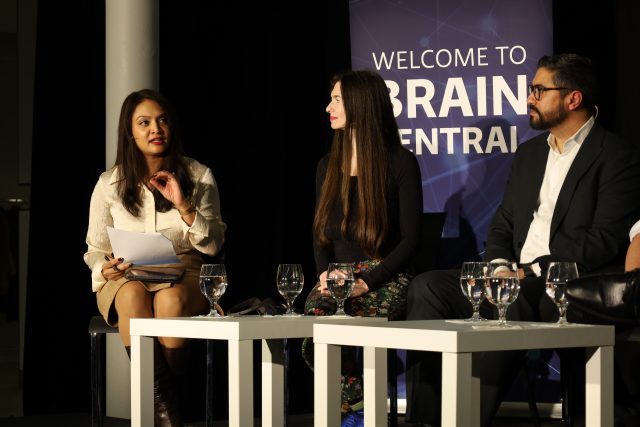Facing the realities of a new life after experiencing a brain injury can be a source of struggle, pain, and a journey of self-discovery. Simple pleasures like playing with your children, making a delicious meal, or biking with a friend can be stripped away in an instant with injuries to the brain following motor vehicle accidents, sports injuries, falls, and assaults. June is Brain Injury Awareness Month in Canada and the Ontario Brain Injury Association (OBIA) offers important services for the community including education, awareness, and support.
Because of the number of people affected by brain injuries and the impact this has on our society, it is important to understand the consequences of brain injury—though many people do not think about these consequences unless they, or a loved one, are directly affected. Heightened media attention surrounding sports concussions over the past few years has brought some awareness to the issue, but more efforts to educate the public could help gleam a light on the triumphs and tragedies experienced by individuals living with brain injuries.
Life can become very different with the physical changes the injury may bring, but it can also mean changes in behavioural, emotional, and social processes that not only affect the individual, but their families as well. These changes can be expressed differently in different people depending on the location of the injury to the brain, age, frequencyof such injuries, etc. Some people may experience the loss of a career or disrupted education, changes in the ability to make friends and interact in social settings, or changes in the way they think about themselves.
A Few Facts about Brain Injury and its Consequences
Contrary to common belief, you don’t have to be knocked unconscious to sustain a brain injury. Mild TBI (also called concussion) can also be associated with long-term damage to brain cells that often doesn’t show up on typical MRI or CT scans. Brain injury can be categorized based on its cause: traumatic brain injury results from a blow to the head, fall or car crash, whereas non-traumatic brain injury is due to stroke, lack of oxygen to the brain (cardiac arrest, near drowning) or infections.
Results from the 2012 Ontario Brain Injury Association (OBIA) Impact Report illustrate some of the debilitating consequences of brain injury: more than 75% of people living with brain injury experience depression and/or anxiety, and more than 90% have trouble with concentration, decision making, and memory. Other complications of brain injury may include: mood swings (76%), dizziness (71%), vision problems (58%), hearing problems (45%), and seizures (22%). Additionally, those having suffered TBI can be at higher risk of developing Alzheimer’s disease or other types of dementia or neurodegenerative disorders later in life. It is also important to point out that not everyone that sustains a brain injury goes on to develop physical and behavioural ailments, which points to the need for further research on vulnerability.
I spoke with Ruth Wilcock, Executive Director of the OBIA. She mentioned some of the services offered by OBIA, such as educational programs held with Brock University and a program called Brain Basics which together have trained over 11,000 people to date who work with individuals with brain injuries. Support mechanisms include a telephone line: 1-800-263-5404 offering information and advocacy, as well as a successful peer support program. I asked Ruth what we as a community can do to help individuals with brain injuries better cope with the changes, and she talked about the need to educate ourselves in order to understand why their friends or families may act the way they are; it is the brain injury. When asked what she has learned through her work at OBIA, Ruth mentioned the resiliency of the human spirit and survivors wanting to make an impact because they’ve lived it and have come out on the other side.
| Key Facts and Figures About Brain Injury |
| • In 2010, there were 227,605 people living with TBI and approximately 22,000 new cases of TBI in Ontario*
• TBI is a leading cause of death and disability in North Americans under 45 • 30% of TBIs occur in children and youth, mostly during sports and recreational activities • The median cost of one year of health system use among incident cases with TBI is $1,408* * Prevalence, Incidence and Costs from Health Administrative Data. Institute for Clinical Evaluative Sciences, 2015 (in press) |
Voices of People Living with Brain Injury (Ontario Brain Injury Association)
“I wish people understood that a brain injury is a real physical and emotional impairment that affects my life in profound ways.”
∞
“The biggest challenge about living with a brain injury has been the fact that my life has been totally turned inside out. Nothing is the same anymore. I no longer work, my friends are not the same, I am not the same person I was and most importantly my family dynamics are not the same. It is starting life all over again as a new person.”
These personal narratives illustrate some of the common experiences and the emotional challenges of this often invisible disability.
Personal Reflections
During past research experience with the Canadian Sports Concussion Research Project at Toronto Western Hospital, I interacted with many individuals having sustained multiple concussions living with memory disturbances, aggression, depression, and apathy. Despite the challenges they are faced with, I could also see their strength shine through. They travelled from near and far to participate in research they considered important to help understand the effects of concussions for future efforts in prevention, treatment and services. By planting the seeds of awareness and knowledge sharing, I am hopeful we can help brain-injury survivors lead fulfilling lives.
Spreading the Message about Brain Injury
For Brain Injury Awareness Month, OBIA launched the release of ‘I AM THE FACE OF BRAIN INJURY’, a video created by individuals living with brain injury, which can be seen here or see their Facebook page and Twitter for more information. Toronto Rehab’s Acquired Brain Injury and Society Research Team is hosting a speaker series to increase accessibility to research on brain injury throughout the month. Talks can be attended in person or viewed via webinar.
By: Ruma Goswami, OBI Intern, Operations



